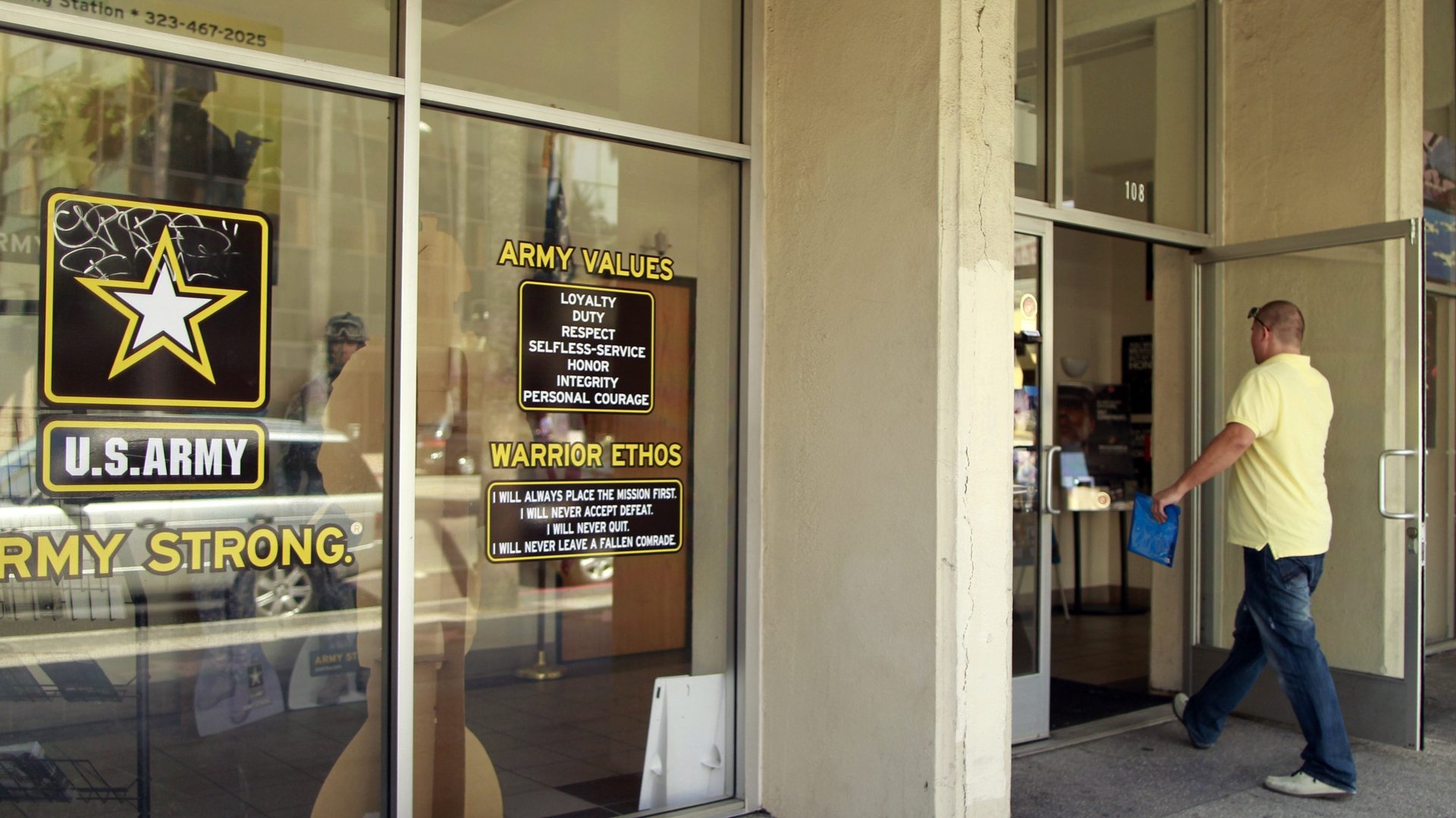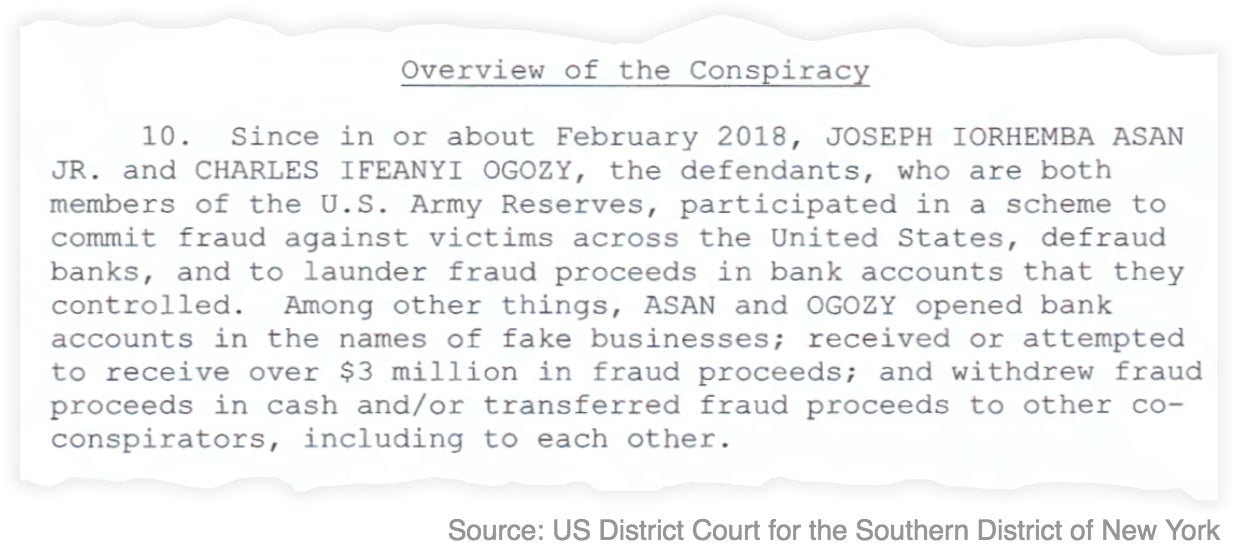Army buddies accused of scamming Marine Corps vets online
Two members of the US Army Reserve scammed senior citizens, widows, businesses, and a Marine Corps veterans association over the course of nearly two years, according to a now-unsealed federal complaint.


Two members of the US Army Reserve scammed senior citizens, widows, businesses, and a Marine Corps veterans association over the course of nearly two years, according to a now-unsealed federal complaint.
Joseph Iorhemba Asan Jr. and Charles Ifeanyi Ogozy joined the Army Reserve in February 2018, and that same month embarked on a “scheme to commit fraud against victims across the United States,” according to the complaint. Prosecutors say the duo amassed up to $3 million.
The money was stolen through two common online scams: business email compromises, in which they impersonated legitimate company employees to trick them into wiring them hundreds of thousands of dollars, as well as romance scams, in which they “deluded unsuspecting older women and men into believing they were in a romantic relationship,” ultimately persuading them to send large amounts of money under false pretenses.

James Lee, the chief operating officer at the Identity Theft Resource Center, a nonprofit, said it’s not uncommon for military service members or their families to be the target of fraud. Veterans and active duty personnel have lost more than $400 million to scams since 2012, according to reports.
“But to everyone’s memory around here, we’ve never seen it where…somebody who is in the military is accused of being the scammer,” Lee told Quartz. “So that is unique. But it also shows that the threats can come from many different quarters.”
Attorneys for Asan and Ogozy did not respond to a request for comment, nor did the Army Reserve. The Army’s Criminal Investigation Division referred Quartz to the FBI, which did not reply to multiple requests for further details.
The romance scam
After her husband passed away, a 67-year-old widow in North Carolina began using an online dating service for people over 50. She unknowingly struck up a remote relationship with a phony persona created by Asan and Ogozy, communicating via phone, text, and email. Although they never met in person, the man sent photos he claimed were of himself, as well as a copy of what he said was his US passport.
After some time, according to case filings, the man told the widow he was in the Philippines working on a project and was unable to access his American bank accounts. He asked if she could send him money and she agreed—to the tune of $75,000. She never got it back. In another similar scheme, prosecutors say Asan and Ogozy scammed a 57-year-old woman living in Illinois out of nearly $45,000.
The business email scam
In August 2018, the treasurer of an unnamed Marine Corps veterans organization received an email from the group’s CEO, requesting that almost $7,000 be wired to a business account under the name Uxbridge Capital, LLC.
The treasurer made the transfer, believing the email had come from his boss. It hadn’t.
A couple of months later, someone posing as the CEO of an unidentified home mortgage company sent an email to the accounting manager instructing them to wire more than $18,000 to Uxbridge Capital. Again, believing they were following orders, the accounting manager transferred the money.
Asan and Ogozy’s most lucrative score came in early 2019. An unnamed chemical company in New Jersey had been working on a deal to buy industrial equipment from a distributor in Pennsylvania for $422,000 via a broker in New York. When the broker got an email that seemed to be from the seller with instructions to wire the buyer’s payment to an account maintained by Uxbridge Capital, they sent it as directed.
In this case the bank spotted the fraud, recalled the transfer and froze the Uxbridge account. Asan and Ogozy tried to explain away the suspicious transactions, reminding a bank representative on the phone that the two were “buddies in the US Army.” It would be the start of their unravelling.

It all falls apart
The FBI began investigating Uxbridge after the chemical company reported nearly being taken for hundreds of thousands of dollars. Investigators found Uxbridge Capital accounts had been opened at at least four different banks between July and September 2018. Each was described in application documents as having a different purpose.
It wasn’t hard to connect Uxbridge to Asan and Ogozy. The address and phone number on the applications matched the address and phone number Asan provided to the Army when he first joined. One of the applications filled out by Asan listed Ogozy as an advisor to Uxbridge.
Between August 2018 and May 2019, the Uxbridge accounts received $1.36 million in deposits. Another account owned by Asan and Ogozy and uncovered by investigators received deposits totaling $1.63 million. It was linked to phone numbers and addresses matching those listed in Asan’s Army enlistment papers.
The FBI arrested Asan and Ogozy on Oct. 31, 2019. A federal grand jury indicted Asan on Jan. 30. However, Ogozy was not—and a motion filed by prosecutors suggests he may in fact be cooperating with investigators.
“The first one that talks gets the best deal,” former NYPD detective sergeant Joseph Giacalone told Quartz. “When you are in the federal system, we’re talking about long sentences and an impetus for others to help themselves out.”